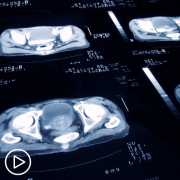How Does Genetic Testing Impact Prostate Cancer Care? from Patient Empowerment Network on Vimeo.
Genetic testing has taken on a vital role in prostate cancer care. Expert Dr. Maha Hussain provides insight about genetics and biomarker testing, how results are used in determining treatment options, and key questions to ask to ensure the best care.
Dr. Maha Hussain is the Deputy Director of the Robert H. Lurie Comprehensive Cancer Center of Northwestern University. Learn more about this expert here.
See More From INSIST! Prostate Cancer
Related Resources
Transcript:
Katherine:
Many patients are confused about the role of genetics and biomarker testing in prostate cancer care.
For people who haven’t heard of some of these terms before, let’s go into the definitions. So, what is genomic or biomarker testing, first of all?
Dr. Hussain:
So, I think there’s one thing. Maybe I can explain because the wording can be confusing. So, there is the genetics, and there is the genomics. The genetics would be what we inherit from our families. So, this would be present in our body. The genomics testing would be to look for what the structure of the genes of the cancer itself, cancer cells itself. Now, that doesn’t mean that this was inherited. It’s just that this is a renegade, and it evolved. And that is what is going to show up.
The reason these two are important, both of them have implications potentially for treatment or perhaps clinical trials. And again, with the PARP inhibitors, the BRCA-like genes will have implications for treatment sort of for resistance cancers.
With regard to the genetics, the implications are for, again, inheritance of family and potential risk for blood relatives. Now, there are panels that are FDA-approved for the purpose of genetic testing. And the requirement or the indications right now, anybody who presents with metastatic disease or an aggressive disease and diagnosis, the recommendation is to proceed with the genetic testing, certainly counseling and testing, because there are some people who prefer not to be tested. And that’s something else.
What I tell my patients is this, even if the testing is done and it was negative for inherited genes that might put the patient family at potential higher risk, the fact that a person has prostate cancer by default puts potential, adds risks to family, to blood relatives.
And the risks aren’t just for the males with regard to prostate cancer, but certainly breast cancer, ovarian cancer, pancreatic cancer potentially, and things of that sort. So, this is where I think a patient needs to be discussing with their doctors. And certainly, there are many centers that have genetics counselor, and so that’s where I generally refer my patients to. I counsel them myself, and then refer them also for more discussions with genetics counselor.
Katherine:
What exactly are genetic mutations? And how do they impact a treatment path?
Dr. Hussain:
Well, I think, again, it’s the changes that happens in specific genes that may promote the aggressiveness of a cancer. And so, the BRCA gene is one of the oldest genes that have been identified in breast cancer. And essentially, the body regulates itself.
And when cancer cells come up and they sort of – the body no longer sustains that regulation, the genetic regulation in those cancer cells. Those cancer cells will behave the way they want to. That means that they’re going to grow faster. That means they could be resistant to treatment and things like that. And so, that’s what we check for, these alterations. And there are certain medications that would allow – and again, in prostate cancer, it’s not a lot. It’s just, as I said, right now the only things that are proven is the PARP inhibitors. This is essentially to kind of gang over the cancer cell, preventing from allowing it to repair itself so it can continue to grow.
Katherine:
Some patients may not know if they’ve received these important tests. So, for patients that aren’t all that sure, what key questions should they be asking their physician or their specialist?
Dr. Hussain:
So, I would say when it comes to the genetics testing, I believe a patient has to consent.
Because again, we live in the U.S., and this is a private matter for the patient. So, this generally has to be the case. Otherwise, depending on the institution, sometimes some tests will require for the overall testing for looking for any genetic alterations, general tumor alternation. Different centers have different things. But the patient should ask and say to their doctor, “Have my cancer genes been tested? Have my genes been tested? And if they have, what are the results?” Because we generally share with the patients once it’s been done.
The other things I should point out, some of the good things that have happened recently. Up until recently, when it comes to the tumor genomic testing, tissue was required. Nowadays, the FDA has approved blood tests that several companies now run that can actually collect blood sample and basically test it for circulating tumor cell genes there.
Now, no testing is 100 percent perfect. But in situations like patients with prostate cancer who may not have recent tissue or adequate tissue for testing, certainly doing the blood test to verify if there is anything reflective of the genes of the cancer, and that may allow for potential actionable-type treatments. Again, up until now, this is more going to apply for potential clinical trials or resistant metastatic disease.









